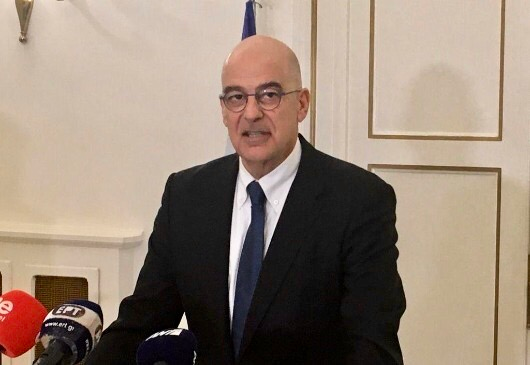 N. DENDIAS: Good afternoon. Thank you very much for being here. I would like to say that, in the National Council on Foreign Policy – in spite of individual assessments – there was consensus on the fundamental observations, as well as solidarity and responsibility among the political forces. This is the most important resource in the country’s diplomatic arsenal.
N. DENDIAS: Good afternoon. Thank you very much for being here. I would like to say that, in the National Council on Foreign Policy – in spite of individual assessments – there was consensus on the fundamental observations, as well as solidarity and responsibility among the political forces. This is the most important resource in the country’s diplomatic arsenal.
I delivered a briefing on the situation in the Eastern Mediterranean, on Turkey’s provocative actions, on its historically and legally groundless claims. I explained that, nevertheless, Greece remains committed to maintaining open channels of communication.
With regard to Libya, I briefed the Council on a number of meetings with third countries and the formation of a front of understanding and shared understanding against the blatant violation of international law that the Turkey-Tripoli agreements constitute. Haftar’s visit to our country proves that Greece has a role in the developments in the region.
With regard to the Western Balkans, I set out our initiatives for promoting the accession perspectives of the Western Balkan states, through the working breakfast we hosted in Brussels in December, as well as the Meeting of Ministers of Foreign Affairs of the Balkan countries and the member states of the European Union, which will take place in Thessaloniki on 24 February.
Finally, I briefed the members of the Council on Foreign Policy on Greece's response to the German government regarding the issue of reparations, and repayment of the occupation loan.
The Greek response to the German side is that Greece does not consider this matter to be settled. Our claims remain active, which is a message we send in no uncertain terms.
Thank you.
REPORTER: Mrs. Anagnostopoulou said that, as Syriza, she would like to see a more proactive policy and that she considers our non-participation in Berlin a mistake and a failure. Do you have anything to say on that?
N. DENDIAS: First of all, a general call for a more proactive foreign policy should, in my opinion, be accompanied by specific suggestions. I believe that Greek diplomacy has held more bilateral and multilateral meetings that ever before.
If there is something else that the government and the Ministry have overlooked, we are prepared to accept the advice of our interlocutors. There are no party lines on national issues. But I didn’t see anything like that expressed.
Regarding the Berlin process, I would like to reiterate the following: The Berlin process was not launched during the term of the current government. It began under the previous government and was assessed in a manner that, at that time, did not lead Greek diplomacy to participate in this initiative. In fact, Greek diplomacy chose to participate in Italy’s Palermo initiative, to which there was no follow-up.
So I think it might be unfair to blame the current government for our non-participation in the Berlin process.
On the other hand, with regard to the German side, the Greek government has let the Germans know – and this will very likely be accepted – that Greece should participate in the continuation of this initiative, which I must say, however, is being passed on to the UN. So far, the Berlin process has not succeeded even on the level of a ceasefire. It is being taken over by the United Nations, under Mr. Salamé. We have always been there. We talk with the United Nations. We’ll see what happens.
Thank you very much.
February 12, 2020


